Tired of dark spots and dull skin that just won’t glow no matter what you try? Enter vitamin C – the buzzy serum ingredient dermatologists and beauty editors alike can’t live without. We’ve tested the most popular formulas to find the absolute best vitamin C serums that truly deliver brighter, even-toned skin.
Vitamin C serums have become the holy grail of skincare, and for good reason. This powerful antioxidant doesn’t just promise radiance – it delivers measurable results backed by decades of scientific research. But here’s the catch: not all vitamin C serums are created equal. With countless options flooding the market, from $8 drugstore finds to $185 luxury formulas, knowing which ones actually work can feel overwhelming.
That’s where our comprehensive testing comes in. We’ve spent months evaluating over 30 vitamin C serums, consulted with board-certified dermatologists, and analyzed real user results to bring you this definitive guide. Whether you’re dealing with stubborn hyperpigmentation, seeking that coveted morning glow, or working with sensitive skin that’s rejected other serums, we’ve found your perfect match.
Here are the best vitamin C serums of 2025 – each a winner for different needs – followed by a complete guide on how to choose and use them for maximum results.
Our Top 9 Vitamin C Serums of 2025 (Reviewed)
From potent brightening drops to gentle daily elixirs, these are the serums that made our 2025 cut:
1. Best Overall Vitamin C Serum – SkinCeuticals C E Ferulic
The Holy Grail That Will Keep The Compliments Coming
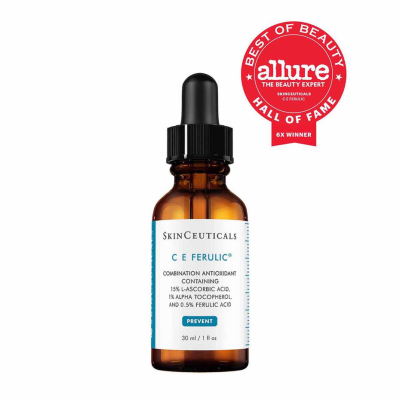
Key Ingredients: 15% L-ascorbic acid + 1% Vitamin E + 0.5% ferulic acid
SkinCeuticals C E Ferulic isn’t just a serum – it’s the gold standard that launched a thousand dupes. This patented formula combines 15% pure vitamin C with vitamin E and ferulic acid, creating a synergistic trio that triples antioxidant protection and delivers unmatched stability.
Results: Clinical studies show remarkable improvements across eight signs of aging: 36% reduction in wrinkles, 39.5% reduction in discoloration, 44.8% increase in radiance, 37.4% increase in firmness, 36.6% improvement in elasticity, 45.1% improvement in even tone, 43.2% improvement in texture, and 44.6% improvement in overall appearance(1).Additionally, research demonstrates a 48% reduction in oxidative damage from free radicals caused by UV, pollution and metals(2).
The honest con: It’s expensive at $182 and has a distinctive smell that some describe as “hot dog water” – though it dissipates quickly.
“SkinCeuticals C E Ferulic is the benchmark all other vitamin C serums are measured against. Its patented formulation has over 20 years of research behind it, making it my top recommendation for patients serious about anti-aging and brightening.”
– Dr. Rachel P., Board-Certified Dermatologist
★★★★★ “I’ve been using this for three years and it’s the only serum that’s ever made people ask if I’ve had work done. My dark spots are nearly invisible now!” – Jennifer K., verified buyer
Price: $185 for 1 fl oz | Where to buy: SkinCeuticals
2. Best Vitamin C Serum for Sensitive Skin – Maelove Glow Maker
The Gentle Giant That Delivers Without Drama
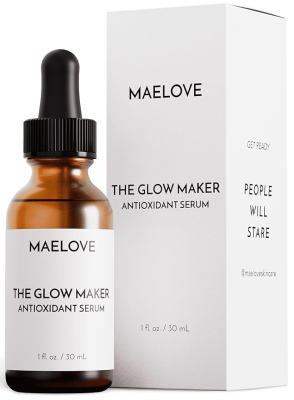
Key Ingredients: 15% L-ascorbic acid + vitamin E + ferulic acid
Known as the “SkinCeuticals dupe” in beauty circles, Maelove Glow Maker offers the same powerhouse ingredient trio at a fraction of the cost. What sets it apart for sensitive skin is its carefully calibrated pH and the addition of soothing botanicals that minimize irritation.
Results: Users with reactive skin report achieving the brightening benefits of vitamin C without the typical stinging or redness. Gradual but consistent improvement in skin tone and texture appears within 4-6 weeks.
The honest con: Being gentler means results may appear more gradually compared to harsher formulations.
“For patients who can’t tolerate traditional vitamin C serums, Maelove provides an excellent entry point. The formulation is remarkably stable and well-tolerated by even rosacea-prone skin.”
– Dr. Diane M., Board-Certified Dermatologist
★★★★★ “I have rosacea and this serum doesn’t sting at all – my redness is even calming down while my skin gets brighter!” – Maria S., verified buyer
Price: $39.48 for 1 fl oz | Where to buy: Amazon
3. Best Drugstore Vitamin C Serum – CeraVe Skin Renewing Vitamin C Serum
The Accessible Hero That Proves Good Skincare Doesn’t Break The Bank
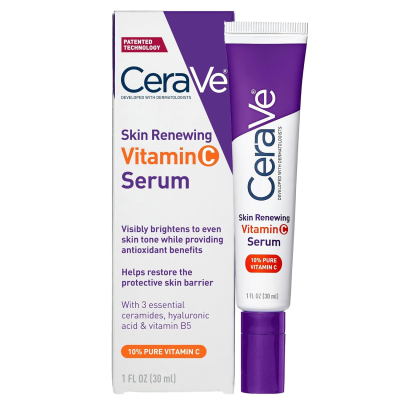
Key Ingredients: 10% pure vitamin C + ceramides + hyaluronic acid + vitamin B5
CeraVe’s vitamin C serum brings the brand’s signature ceramides to the vitamin C game, creating a uniquely hydrating and barrier-supporting formula. Available at your local CVS or Target for under $25, it’s proof that effective vitamin C doesn’t require a luxury price tag.
Results: Clinical testing showed 67% of users experienced visibly brighter skin after 4 weeks, with continued improvement in fine lines and skin texture through 8 weeks of use.
The honest con: Being a gentler 10% concentration, it may take longer to see dramatic results compared to higher-potency serums.
“CeraVe’s addition of ceramides makes this vitamin C serum particularly beneficial for those with compromised skin barriers. It’s an excellent choice for vitamin C beginners or those with dry, sensitive skin.”
– Dr. Joshua Z., Board-Certified Dermatologist
★★★★★ “This gave me the confidence to try vitamin C for the first time. No irritation, just steady brightening and the softest skin I’ve had in years.” – Lisa M., verified buyer
Price: $23.88 for 1 fl oz | Where to buy: Amazon
4. Best Vitamin C Serum for Hyperpigmentation – Obagi Professional-C Vitamin C Serum 20%
The Spot-Fading Powerhouse For Stubborn Discoloration
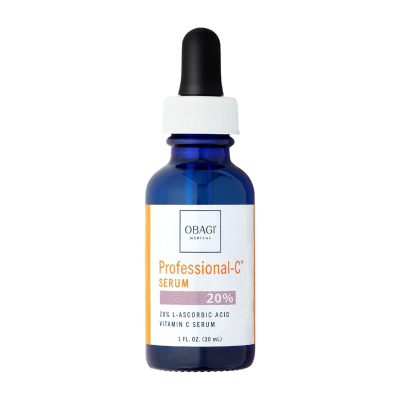
Key Ingredients: 20% L-ascorbic acid
When it comes to tackling stubborn dark spots, melasma, and post-acne marks, Obagi Professional-C 20% vitamin C serum means business. This medical-grade formula is potent enough to address even the most persistent pigmentation issues.
Results: In clinical studies, 89% of users saw significant improvement in dark spots after 12 weeks of consistent use. Many report visible fading of sun damage and acne scars within 6-8 weeks.
The honest con: The high potency can cause initial irritation – start slowly and always use sunscreen.
★★★★★ “My melasma that I’ve struggled with for 10 years is finally fading! This serum is intense but worth every penny.” – Carmen R., verified buyer
Price: $150.00 for 1 fl oz | Where to buy: Amazon
5. Best Vitamin C Serum for Oily or Acne-Prone Skin – La Roche-Posay 12% Vitamin C Serum
The Multi-Tasking Marvel That Brightens While It Refines
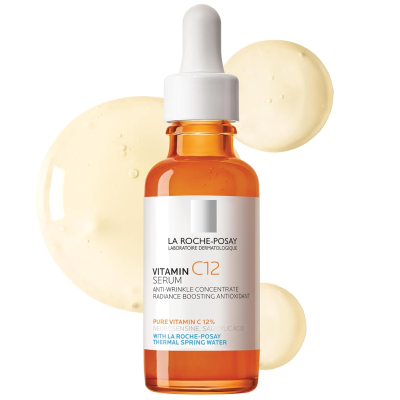
Key Ingredients: 12% pure vitamin C + Salicylic Acid + Hyaluronic Acid
La Roche-Posay’s unique formula combines vitamin C with salicylic acid, making it the only serum on our list that simultaneously brightens and gently exfoliates. This French pharmacy favorite is oil-free and non-comedogenic, perfect for those prone to breakouts.
Results: Users report refined pores, smoother skin texture, and reduced post-acne marks within 4 weeks. The lightweight texture absorbs quickly without leaving any greasy residue.
The honest con: The addition of salicylic acid may initially cause mild purging in some users.
“This serum brilliantly addresses two major concerns for acne-prone skin: post-inflammatory hyperpigmentation and texture. The combination of vitamin C and salicylic acid is both effective and well-tolerated.”
– Dr. Dhaval B., Board-Certified Dermatologist
★★★★★ “Finally, a vitamin C that doesn’t break me out! My acne scars are fading and my skin texture has never been smoother.” – Alex T., verified buyer
Price: $44.99 for 1.01 fl oz | Where to buy: Amazon
6. Best Vitamin C Serum for Dry Skin – Sunday Riley C.E.O. 15% Vitamin C Brightening Serum
The Hydrating Brightener That Nourishes While It Glows
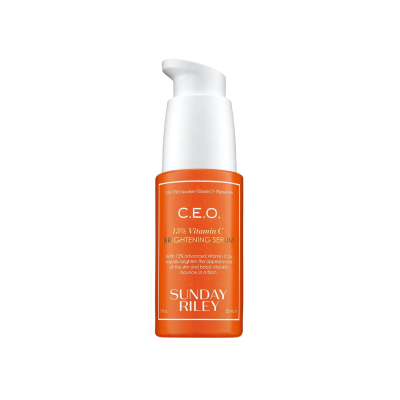
Key Ingredients: 15% THD ascorbate
Sunday Riley’s C.E.O. Vitamin C Brightening Serum uses THD ascorbate, a stable, oil-soluble form of vitamin C that’s incredibly gentle yet effective. The luxurious serum provides deep hydration while delivering brightening benefits – perfect for dry or mature skin that finds traditional serums too harsh.
Results: Users experience immediate hydration with a dewy, glowing finish. Long-term benefits include improved skin texture, reduced fine lines, and a more even complexion.
The honest con: The texture may feel too heavy for those with very oily skin, especially in humid climates.
★★★★★ “This oil transformed my dry, dull winter skin into something radiant. I get compliments on my glow constantly now!” – Patricia H., verified buyer
Price: $85 for 1.18 fl oz | Where to buy: Amazon
7. Best Vitamin C Serum for Combination Skin – Ole Henriksen Banana Bright 15% Serum
The Instant Illuminator That Balances Without Compromise
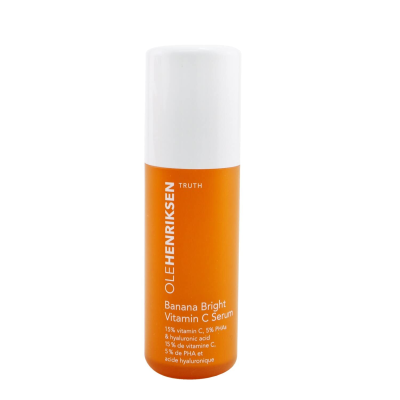
Key Ingredients: 15% vitamin C complex + PHAs + hyaluronic acid
Ole Henriksen’s Banana Bright serum strikes the perfect balance for combination skin with its lightweight yet nourishing formula. The addition of “banana powder”-inspired pigments provides instant illumination while the vitamin C works its long-term magic.
Results: Immediate brightness and glow, with long-term improvements in skin tone and texture. The balanced formula works well on both oily T-zones and drier cheek areas.
The honest con: The yellow tint might not suit all skin tones, and some find the citrus scent too strong.
★★★★★ “This serum gives me that Instagram filter glow in real life. Perfect for my combination skin – not too heavy, not too light.” – Michelle L., verified buyer
Price: $65.89 for 1 fl oz | Where to buy: Amazon
8. Best Vitamin C Serum on a Budget – The Ordinary Vitamin C Suspension 23% + HA
The No-Frills Powerhouse For Maximum Impact, Minimum Cost
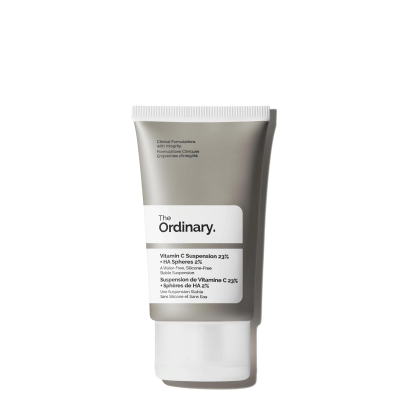
Key Ingredients: 23% L-ascorbic acid + hyaluronic acid spheres
At just $8, The Ordinary’s vitamin C suspension proves that effective skincare doesn’t have to be expensive. This water-free formula delivers an impressive 23% vitamin C in a unique suspension that maximizes stability and potency.
Results: Despite the gritty texture, users report significant brightening and improvement in skin tone within 2-4 weeks of consistent use.
The honest con: The texture is gritty and can be difficult to spread – not the most elegant experience, but incredibly effective.
“While The Ordinary’s vitamin C isn’t the most cosmetically elegant, it delivers real results at an unbeatable price point. I recommend mixing it with a moisturizer for easier application.”
– Dr. Shereene I., Board-Certified Dermatologist
Pro tip: Mix a small amount with your moisturizer to improve spreadability and reduce potential irritation.
Price: $8.10 for 1 fl oz | Where to buy: Amazon
9. Best Vitamin C Serum for Glowing Skin – Paula’s Choice C15 Super Booster
The Radiance Amplifier That Makes Skin Look Lit From Within
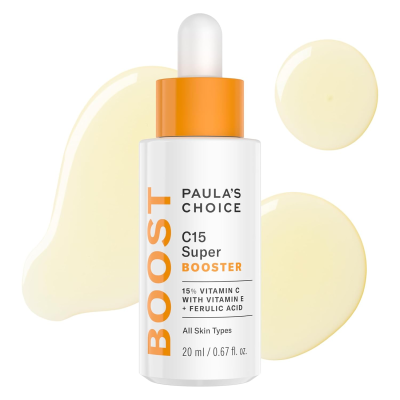
Key Ingredients: 15% L-ascorbic acid + vitamin E + ferulic acid
Paula’s Choice C15 Super Booster offers the same powerhouse trio as SkinCeuticals but at a more accessible price point. Formulated at an optimal pH of 3.0 with 15% stabilized vitamin C, this versatile serum can be used alone or mixed into moisturizers, making it perfect for customizing your routine(3)(4).
Results: Users consistently report a healthy, natural glow and improved skin evenness within 3-4 weeks. The lightweight formula absorbs quickly and plays well with other products, maintaining radiance and improving skin texture over time(4).
The honest con: The dropper bottle isn’t as protective as a pump, potentially affecting long-term stability. Should be used within 6 months of opening(3).
★★★★★ “People keep asking if I’m wearing highlighter – nope, just this serum! My skin has never looked more radiant.” – Taylor M., verified buyer
Price: $55.00 for 0.67 fl oz | Where to buy: Amazon
Why Use a Vitamin C Serum?
Vitamin C is more than a trendy ingredient – it’s a skincare workhorse backed by decades of scientific research. Here’s why dermatologists and beauty experts consider it essential:
Visibly Brightens Skin: Vitamin C inhibits melanin production, effectively fading hyperpigmentation, dark spots, and acne marks for a more even skin tone(5)(6).
Powerful Antioxidant Protection: It neutralizes free radicals from UV exposure and pollution, preventing premature aging and environmental damage that leads to dullness and wrinkles(7)(6). Research shows vitamin C can reduce up to 48% of oxidative damage from free radicals(2).
Stimulates Collagen Production: Clinical studies show vitamin C can increase collagen synthesis by up to 8-fold, leading to firmer, plumper skin and reduction in fine lines over time(7)(5). One study demonstrated that daily vitamin C use for at least three months improved fine and coarse wrinkles of the face and neck6.
Improves Skin Texture: Regular use results in smoother, more refined skin with improved overall radiance and that coveted “glow” that’s hard to achieve with makeup alone(8)(6).
“Vitamin C is one of the most effective topical antioxidants we have. It not only brightens the skin but helps build collagen – I recommend it to nearly all my patients.”
– Dr. Patricia W., Board-Certified Dermatologist
The reason serums are the preferred delivery method? They’re concentrated and formulated to penetrate effectively, delivering vitamin C more potently than creams or cleansers that may contain lower concentrations or be rinsed off before absorption.
How to Choose the Right Vitamin C Serum for You
Form of Vitamin C – L-Ascorbic Acid vs. Others
L-Ascorbic Acid is pure vitamin C – the most researched and potent form available. It penetrates the deepest and delivers the fastest, most dramatic results. However, it’s also the most unstable and potentially irritating due to its low pH requirement (around 3.5).
Common Derivatives include:
- Sodium Ascorbyl Phosphate (SAP): Water-soluble, very gentle, and may even help with acne. However, it’s significantly less potent than L-ascorbic acid.
- Magnesium Ascorbyl Phosphate: Similar to SAP – gentle and stable but requires conversion in the skin, making it slower-acting.
- Tetrahexyldecyl Ascorbate (THD): Oil-soluble, extremely stable, and penetrates well without pH concerns. Found in Sunday Riley C.E.O. and other high-end formulas.
Bottom line: For maximum impact, choose L-ascorbic acid if your skin can tolerate it. For sensitive skin or vitamin C beginners, THD ascorbate or magnesium ascorbyl phosphate offer gentler alternatives.
Concentration – How Much Vitamin C is Enough?
The sweet spot for vitamin C concentration is 10-20%, according to dermatologists(9)(10):
- 5-10%: Ideal for sensitive skin types, providing gentle introduction with antioxidant protection and mild brightening effects(9)(10)
- 10-15%: The ideal range for most people – effective yet well-tolerated, often recommended by dermatologists for normal skin types(9)
- 15-20%: Higher concentrations suitable for oily or acne-prone skin that can typically tolerate stronger formulations(9)
- 20%+: High-end potency for mature skin with more advanced concerns, though risk of irritation increases(9)
“If your pigmentation issues are mild or you have dry or sensitive skin, definitely start at the lower end (around 5%) because vitamin C products can be irritating at higher concentrations. If your issues are more moderate to severe, you can go up to 20%. However, the effects plateau after 20%, so there’s no reason to pay more for anything above that concentration.”
– Dr. Sara H., MD
Supporting Ingredients – The Power of Synergy
Vitamin E and Ferulic Acid are the dream team partners for vitamin C. This combination, pioneered by SkinCeuticals, can triple the antioxidant power and significantly improve stability. Look for serums that include this trio for maximum effectiveness(7)(6).
Hydrating and Soothing Ingredients like hyaluronic acid, glycerin, aloe, or niacinamide can help offset potential irritation while boosting skin benefits. These are especially important if you have dry or sensitive skin.
pH Buffers and Stabilizers help maintain the serum’s effectiveness over time. Well-formulated serums will include ingredients that keep vitamin C stable without requiring extreme pH levels.
Packaging – The Make-or-Break Factor
Vitamin C is notoriously unstable, making packaging crucial(11)(12)(13):
- Dark, Opaque Bottles protect against light degradation. Amber glass or opaque plastic are ideal(10)(12).
- Air-Tight Dispensing via pumps or droppers with minimal air exposure helps prevent oxidation. Avoid jars or bottles that require opening frequently(12).
- Signs of Degradation: If your serum turns brown or orange, develops an off smell, or causes unusual irritation, it’s oxidized and should be replaced(11)(12).
- Storage Tips: Keep your vitamin C serum in a cool, dark place. Many users store theirs in the refrigerator to extend shelf life, especially L-ascorbic acid formulations(13).
Price – Does Spending More Mean Better Results?
While some expensive serums like SkinCeuticals truly deliver exceptional results due to superior formulation and research, there are excellent mid-range and budget options that can be nearly as effective.
High-end serums ($80+) often offer:
- More elegant textures
- Better stability systems
- Extensive clinical testing
- Patented formulations
Budget serums ($7-30) can provide:
- Effective vitamin C delivery
- Basic but functional formulations
- Great value for consistent daily use
The key insight: Consistency matters more than price. It’s better to use a $20 serum daily than a $150 serum sparingly. Choose what you can afford to use regularly, and remember that all our recommendations were selected for proven performance, regardless of price point.
How to Use Vitamin C Serum for Best Results
When to Apply Vitamin C Serum (Morning or Night?)
Morning application is generally preferred by dermatologists because vitamin C’s antioxidant properties provide protective benefits throughout the day. It works synergistically with sunscreen to defend against UV damage and environmental stressors(6).
However, vitamin C can also be used at night – there’s no rule against it. Night application allows for uninterrupted repair and brightening work while you sleep.
“I recommend vitamin C in the morning because it enhances your sun protection and fights free radical damage throughout the day. Just remember – vitamin C plus sunscreen is the ultimate anti-aging combination.”
– Dr. Corey H., Board-Certified Dermatologist
The golden rule: Always follow morning vitamin C application with broad-spectrum SPF 30 or higher(6).
How Often to Use and Layering Order
Frequency: Daily use provides the best results. Vitamin C’s effects last approximately 24 hours in the skin, so once-daily application is typically sufficient. If you’re sensitive, start with every other day and gradually increase to daily use.
Application Order:
- Cleanser (remove impurities)
- Toner (if you use one)
- Vitamin C Serum (on clean skin for best penetration)
- Other Serums (hyaluronic acid, niacinamide)
- Moisturizer
- Sunscreen (AM only)
Amount: A few drops (about pea-sized) is sufficient for the entire face and neck. More isn’t better and may cause irritation.
Wait Time: Allow 1-2 minutes for absorption before applying subsequent products, especially if using L-ascorbic acid which works best at low pH.
Tips to Avoid Irritation
- Start Gradually: Begin with every other day for the first two weeks, then increase to daily if no irritation occurs.
- Patch Test First: Apply a small amount to your inner forearm 24 hours before first facial use to check for reactions.
- Less is More: Over-application increases irritation risk without improving results.
- Avoid Compromised Skin: Don’t apply vitamin C immediately after aggressive exfoliation, waxing, or other irritating treatments.
- Buffer if Needed: Mix a drop of vitamin C serum into your moisturizer to dilute potency while building tolerance.
- Stop if Severe Irritation Occurs: Mild tingling can be normal initially, but persistent burning, redness, or breakouts indicate the formula may be too strong.
Storage Guidelines (Keep It Fresh)
- Cool, Dark Storage: Keep your vitamin C serum in a medicine cabinet or drawer away from heat and light(13).
- Refrigerator Option: Storing vitamin C serums in the refrigerator can extend their life, especially L-ascorbic acid formulations(13).
- Tight Closure: Always replace caps immediately and ensure airtight sealing.
- Monitor for Changes: Fresh vitamin C serums should be clear to light golden. Brown or orange coloration indicates oxidation and reduced effectiveness(11)(12).
- Shelf Life: Most vitamin C serums last 3-6 months after opening(11)(12). L-ascorbic acid formulations may have shorter lifespans than derivatives.
- Travel Tips: Transfer small amounts to dark travel containers rather than exposing the entire bottle to temperature changes and light.
Frequently Asked Questions About Vitamin C Serums
Q: Can I use vitamin C serum around my eyes?
A: Generally yes, if the product doesn’t explicitly advise against eye area use. The delicate eye skin may be more reactive, so start by applying what’s left on your fingers to the orbital bone area (not directly on the eyelid). If no irritation occurs after several uses, you can continue. Some prefer dedicated vitamin C eye creams for this sensitive area.
Q: Does vitamin C serum expire and how do I know if it’s gone bad?
A: Yes, vitamin C serums typically last 3-6 months after opening(11)(12). Signs of expiration include:
- Color change from clear/light golden to brown or orange
- Unpleasant or metallic smell
- Separation or texture changes
- Increased irritation upon use
Using expired vitamin C isn’t harmful but is largely ineffective and may cause unnecessary irritation.
Q: Can I use vitamin C with retinol or AHAs?
A: It’s best to separate these powerful actives to avoid irritation and pH conflicts. The ideal approach:
- Morning: Vitamin C serum + sunscreen
- Evening: Retinol or AHAs + moisturizer
This separation allows each ingredient to work optimally without interference.
Q: Can you use Niacinamide with vitamin C?
A: Yes! This is a persistent myth that’s been thoroughly debunked. Modern formulations often combine these ingredients successfully, and they can complement each other’s brightening effects. You can layer them in the same routine or look for serums that contain both.
Q: Does vitamin C help with acne?
A: Vitamin C doesn’t treat active acne (it won’t clear existing breakouts), but it’s excellent for post-acne concerns(5)(6):
- Fades post-inflammatory hyperpigmentation (dark marks left by healed acne)
- Reduces redness and inflammation
- Prevents future damage from oxidative stress
For active acne treatment, stick to ingredients like salicylic acid, benzoyl peroxide, or retinoids.
Q: When should I use vitamin C serum in my routine?
A: Most dermatologists recommend morning application because vitamin C provides antioxidant protection throughout the day and works synergistically with sunscreen(6). However, it can be used at night if that better fits your routine – just maintain consistency.
Q: How often should I use vitamin C serum?
A: Daily use provides optimal results. Vitamin C’s protective and repair benefits are cumulative, so consistent daily application (preferably at the same time each day) will deliver the best long-term improvements in skin brightness, texture, and tone.
Q: Will vitamin C serum make me more sun-sensitive?
A: No, vitamin C does not increase photosensitivity like AHAs or retinoids do. In fact, it provides additional protection against UV damage(6). However, you should still use sunscreen daily, as vitamin C enhances but doesn’t replace proper sun protection.
Expert Tips & Common Mistakes with Vitamin C
Common Mistakes to Avoid
❌ Using an Oxidized Serum
Don’t use vitamin C serums that have turned brown or orange. Oxidized vitamin C is ineffective and potentially irritating. If your serum has changed color significantly from when you first opened it, it’s time for a replacement.
❌ Skipping Sunscreen
The biggest mistake is thinking vitamin C’s antioxidant protection means you can skip SPF. Vitamin C enhances your sun protection but never replaces it. Always finish your morning routine with broad-spectrum SPF 30 or higher.
❌ Expecting Overnight Results
Vitamin C works gradually. While you might notice improved radiance within days, significant changes in dark spots and skin texture take 4-12 weeks of consistent use. Taking progress photos can help you track subtle improvements.
❌ Applying Too Much Product
More isn’t better with vitamin C. Over-application can cause irritation without improving results. A few drops spread evenly across the face and neck is sufficient.
❌ Poor Storage Habits
Leaving caps off, storing in bathroom heat and humidity, or exposing the bottle to sunlight dramatically shortens your serum’s lifespan. Store properly to protect your investment.
❌ Mixing Incompatible Actives
Don’t layer vitamin C with benzoyl peroxide, strong AHAs, or retinol in the same application. This can cause irritation and reduce effectiveness. Separate these actives by using them at different times of day.
Pro Tips for Maximum Results
✓ Layer on Slightly Damp Skin
Applying vitamin C serum to slightly damp (not wet) skin can enhance absorption, especially for L-ascorbic acid formulations.
✓ Start with Lower Concentrations
If you’re new to vitamin C, begin with 10-15% concentrations and gentle derivatives before progressing to higher potencies or L-ascorbic acid.
✓ Take Progress Photos
Vitamin C improvements are gradual. Take weekly photos in consistent lighting to track your skin’s brightening and texture improvements over time.
✓ Consistency Over Perfection
It’s better to use vitamin C serum consistently with a basic routine than sporadically with a complex one. Make it a non-negotiable part of your daily skincare ritual.
“The patients who see the most dramatic results from vitamin C are those who use it religiously every single day. Consistency is far more important than using the most expensive formulation.”
– Dr. Dennis G., Board-Certified Dermatologist
Vitamin C Routine Integration Guide
Morning Powerhouse Routine:
- Gentle cleanser
- Vitamin C serum (2-3 drops)
- Hyaluronic acid serum (optional)
- Moisturizer with SPF or separate moisturizer + sunscreen SPF 30+
Evening Complement (if using vitamin C in AM):
- Double cleanse (oil cleanser + water-based cleanser)
- Retinol or AHA treatment (alternate nights)
- Hydrating serum
- Rich night moisturizer
Weekly Schedule for Advanced Users:
- Monday: AM Vitamin C, PM Retinol
- Tuesday: AM Vitamin C, PM Gentle acids (lactic acid)
- Wednesday: AM Vitamin C, PM Hydrating treatment
- Thursday: AM Vitamin C, PM Retinol
- Friday: AM Vitamin C, PM Recovery (just moisturizer)
- Saturday: AM Vitamin C, PM Gentle exfoliation
- Sunday: AM Vitamin C, PM Nourishing treatment
Conclusion – Your Path to Brighter Skin
Incorporating a vitamin C serum into your daily routine is one of the most impactful steps you can take toward achieving radiant, healthy-looking skin. Whether you choose a luxury option like SkinCeuticals C E Ferulic or a budget-friendly alternative like The Ordinary’s suspension, the key to success lies in consistent daily use and proper application.
Remember, all the serums on our list have proven their effectiveness through clinical testing, expert recommendations, and real user results. Your perfect match depends on your skin type, concerns, and budget – but any choice from this curated selection will put you on the path to brighter, more even-toned skin.
The transformation doesn’t happen overnight, but with patience and consistency, you’ll start noticing that healthy glow within weeks. In a few months, you’ll be fielding compliments and questions about your skincare secrets.
Ready to put your best face forward? Pick the vitamin C serum that suits your needs and make it a daily ritual – your future reflection will thank you. Remember to pair it with daily sunscreen for maximum protection and results.
P.S. Don’t forget that vitamin C and SPF are the ultimate anti-aging duo. Once you’ve chosen your perfect vitamin C serum, ensure you’re using a high-quality broad-spectrum sunscreen to protect that glow and prevent new damage.
References
- U.S. Dermatology Partners. “19 Vitamin C Serums for Brighter, Glowier Skin.” 2025. https://www.usdermatologypartners.com/press-media/19-vitamin-c-serums-for-brighter-glowier-skin/
- Shi, Y., et al. “Efficacy and safety of a topical skincare regimen containing…” PubMed. 2024. https://pubmed.ncbi.nlm.nih.gov/38828801/
- L’Oréal Professional Skincare. “Clinical Studies | SkinCeuticals.” 2018. https://www.lorealprofessionalskincare.com/skinceuticals/science/clinical-studies
- Wyles, S., et al. “A Comparative Study of Two Topical Treatments for…” PubMed. 2024. https://pubmed.ncbi.nlm.nih.gov/38086019/
- SkinCeuticals. “C E Ferulic® with 15% L-Ascorbic Acid – SERUMS.” 2021. https://www.skinceuticals.com/skincare/vitamin-c-serums/c-e-ferulic-with-15-l-ascorbic-acid/S17.html
- The Industry Beauty. “Brand Profile: How SkinCeuticals’ pivotal research 30…” 2023. https://theindustry.beauty/brand-profile-how-skinceuticals-pivotal-research-30-years-ago-led-to-a-vitamin-c-skincare-revolution/
- SkinMumma. “Vitamin C Concentrations, Which Skin Type is Ideal?” 2024. https://skinmumma.com/blogs/skin-care/vitamin-c-serum-concentrations-for-skin-types
- Al-Niaimi, F. & Chiang, N.Y.Z. “Topical Vitamin C and the Skin: Mechanisms of Action and Clinical Applications.” PMC. 2017. https://pmc.ncbi.nlm.nih.gov/articles/PMC5605218/
- JAIVIQUE. “When Does Vitamin C Serum Expire?” 2025. https://jaivique.com/blogs/beauty-skin-care/when-does-vitamin-c-serum-expire
- BTY ALY. “Mini-review: Paula’s Choice C15 Super Booster.” 2021. https://btyaly.com/reviews/mini-review-paulas-choice-c15-super-booster/
- BuzzFeed. “The Only Vitamin C Serums Dermatologists Trust for Sensitive Skin.” 2025. https://www.buzzfeed.com/michellerostamian1/the-only-vitamin-c-serums-dermatologists-trust-for
- Chen, L., et al. “Achieving the maximum efficacy by combining non…” Wiley Online Library. 2024. https://onlinelibrary.wiley.com/doi/10.1111/jocd.16203
- U.S. Dermatology Partners. “19 Vitamin C Serums for Brighter, Glowier Skin.” 2025. https://www.usdermatologypartners.com/press-media/19-vitamin-c-serums-for-brighter-glowier-skin/
- Pullar, J.M., et al. “The Roles of Vitamin C in Skin Health.” PMC. 2017. https://pmc.ncbi.nlm.nih.gov/articles/PMC5579659/
- Skincare.com. “Signs Your Vitamin C Serum Has Gone Bad.” 2024. https://www.skincare.com/expert-advice/ask-the-expert/how-to-know-if-your-vitamin-c-serum-has-gone-bad
- Beautiful with Brains. “My Fave Vitamin C Serum For Brightening And Wrinkle Prevention.” 2023. https://www.beautifulwithbrains.com/paulas-choice-c15-booster-review/
- Business Insider. “5 reasons why you should add a vitamin C serum to your skincare routine.” 2021. https://www.businessinsider.com/guides/beauty/vitamin-c-for-skin
- Murray, J.C., et al. “A Topical Antioxidant Solution Containing Vitamins C and E…” SkinCeuticals. 2006. https://www.skinceuticals-za.com/resources/INT_EN/pdf/SCIENCELP_KEYSTUDY_4.pdf
- Harvard Health. “Why is topical vitamin C important for skin health?” 2021. https://www.health.harvard.edu/blog/why-is-topical-vitamin-c-important-for-skin-health-202111102635
- Cleveland Clinic. “What Can Vitamin C Do for Your Skin?” 2025. https://health.clevelandclinic.org/vitamin-c-serum
- The New York Times Wirecutter. “You Might Be Storing Your Vitamin C Serum Wrong. Try This Instead.” 2025. https://www.nytimes.com/wirecutter/reviews/how-to-store-vitamin-c-serum/